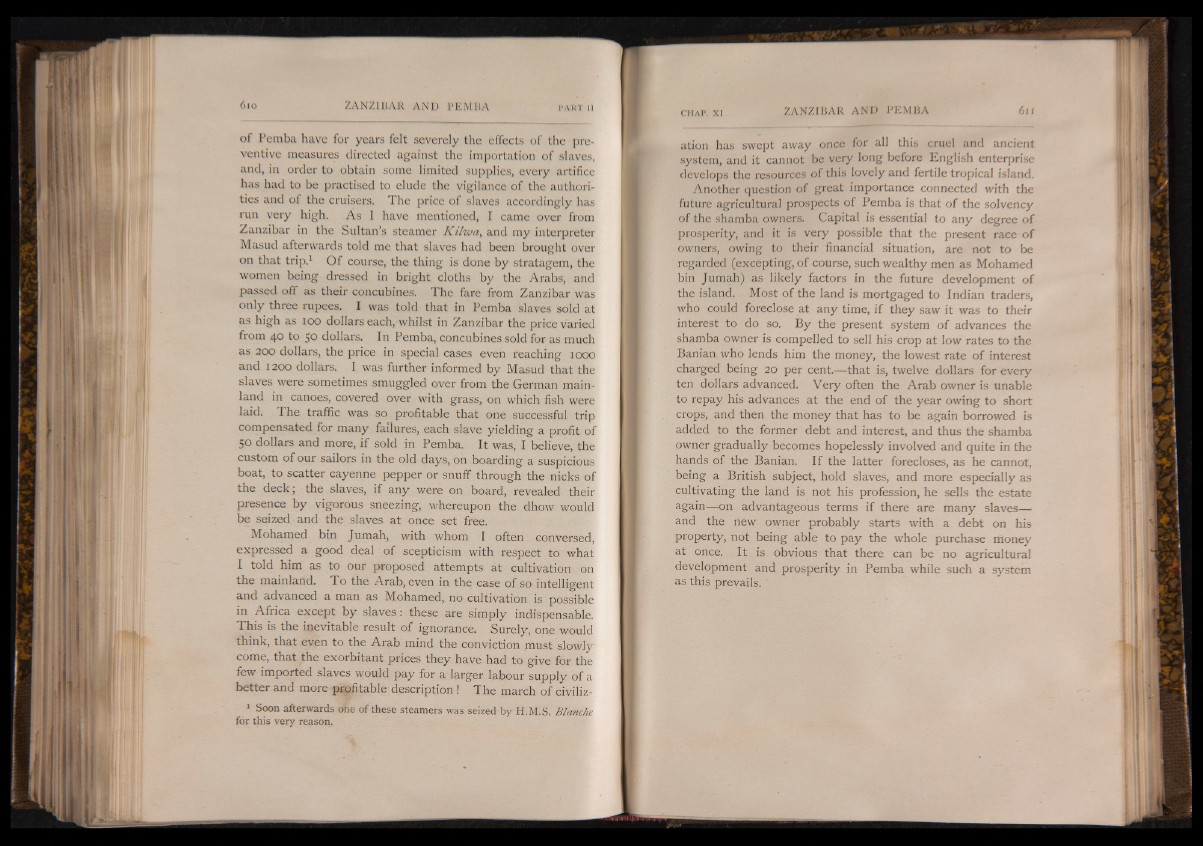
of Pemba have for years felt severely the effects of the preventive
measures directed against the importation of slaves,
and, in order to obtain some limited supplies, every artifice
has had to be practised to elude the vigilance of the authorities
and of the cruisers. The price of slaves accordingly has
run very high. As I have mentioned, I came over from
Zanzibar in the Sultan’s steamer Kilwa, and my interpreter
Masud afterwards told me that slaves had been brought over
on that trip.1 Of course, the thing is done by stratagem, the
women being dressed in bright cloths by the Arabs, and
passed off as their concubines. The fare from Zanzibar was
only three rupees. I was told that in Pemba slaves sold at
as high as too dollars each, whilst in Zanzibar the price varied
from 40 to 50 dollars. In Pemba, concubines sold for as much
as 200 dollars, the price in special cases even reaching 1000
and 1200 dollars. I was further informed by Masud that the
slaves were sometimes smuggled over from the German mainland
in canoes, covered over with grass, on which fish were
laid. The traffic was so profitable that one successful trip
compensated for many failures, each slave yielding a profit of
50 dollars and more, if sold in Pemba. It was, I believe, the
custom of our sailors in the old days, on boarding a suspicious
boat, to scatter cayenne pepper or snuff through the nicks of
the deck; the slaves, if any were on board, revealed their
presence by vigorous sneezing, whereupon the dhow would
be seized and the slaves at once set free.
Mohamed bin Jumah, with whom I often conversed,
expressed a good deal of scepticism with respect to what
I told him as to our proposed attempts at cultivation on
the mainland. To the Arab, even in the case of so intelligent
and advanced a man as Mohamed, no cultivation is possible
in Africa except by slaves: these are simply indispensable.
This is the inevitable result of ignorance. Surely, one would
think, that even to the Arab mind the conviction must slowly
come, that the exorbitant prices they have had to give for the
few imported slaves would pay for a larger labour supply of a
better and more profitable description ! The march of civiliz-
1 s ° on afterwards one of these steamers was seized by H.M.S. Blanche
for this very reason.
ation has swept away once for all this cruel and ancient
system, and it cannot be very long before English enterprise
develops the resources of this lovely and fertile tropical island.
Another question of great importance connected with the
future agricultural prospects of Pemba is that of the solvency
of the shamba owners. Capital is essential to any degree of
prosperity, and it is very possible that the present race of
owners, owing to their financial situation, are not to be
regarded (excepting, of course, such wealthy men as Mohamed
bin Jumah) as likely factors in the future development of
the island. Most of the land is mortgaged to Indian traders,
who could foreclose at any time, if they saw it was to their
interest to do so. By the present system of advances the
shamba owner is compelled to sell his crop at low rates to the
Banian who lends him the money, the lowest rate of interest
charged being 20 per cent.— that is, twelve dollars for every
ten dollars advanced. Very often the Arab owner is unable
to repay his advances at the end of the year owing to short
crops, and then the money that has to be again borrowed is
added to the former debt and interest, and thus the shamba
owner gradually becomes hopelessly involved and quite in the
hands of the Banian. I f the latter forecloses, as he cannot,
being a British subject, hold slaves, and more especially as
cultivating the land is not his profession, he sells the estate
again— on advantageous terms if there are many slaves—■
and the new owner probably starts with a debt on his
property, not being able to pay the whole purchase money
at once. It is obvious that there can be no agricultural
development and prosperity in Pemba while such a system
as this prevails.